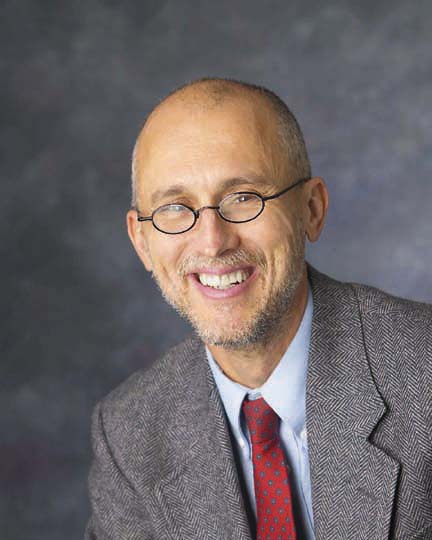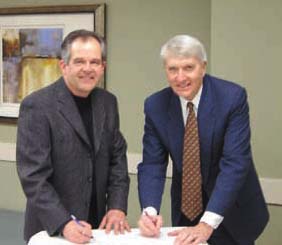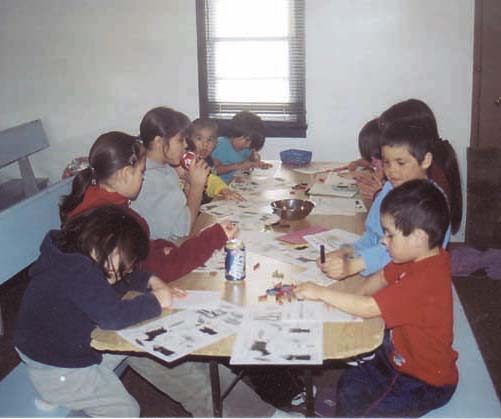
Canadian Mennonite
Volume 9, No. 04
February 21, 2005

HealthLink teams nurse with pastoral staff
Saskatoon, Sask.
A new initiative by Mennonite Central Committee Saskatchewan’s HealthLink program is prompting the church to ask how Mennonites should be involved in healthcare.
“In the past hundred years, the church has drifted away from healthcare ,” says Judy Johnson, a congregational nurse at Saskatoon’s Forest Grove Mennonite Brethren Church. She is the only nurse working in such a capacity in a Saskatchewan Mennonite church. As such, she may be on the wave of renewed Mennonite involvement in healthcare.
,” says Judy Johnson, a congregational nurse at Saskatoon’s Forest Grove Mennonite Brethren Church. She is the only nurse working in such a capacity in a Saskatchewan Mennonite church. As such, she may be on the wave of renewed Mennonite involvement in healthcare.
Johnson sees herself as an aid to the pastoral team at this multi-staff congregation with an average attendance of almost 900. She gets referrals from the pastors and has gathered around her a set of eyes and ears in the form of a congregational Health Cabinet. The cabinet is made up of volunteers who let her know who has needs. And who has needs can vary widely. Ranging across the spectrum of medical, social, emotional and spiritual needs, queries come from teens struggling with self-esteem, isolated caregivers, families with disabled children, and people dealing with mental health issues.
Defined as a “Christian nurse in a church setting,” a congregational or parish nurse helps in a number of ways.
“It’s another way of linking people in the church together,” explains Johnson. She sees a definite need to get people away from the constant “me” focus prevalent in society. She also wants to use her role to reconnect the congregation with health issues.
Another goal is to assist pastors who may feel overwhelmed with the medical needs of their parishioners. Congregational nursing covers many integral areas, says Johnson.
“It involves health promotion and education, one-to-one counselling, making assessments and referrals,” she notes. Congregational nursing involves the heart, too. Most nurses working in this capacity feel called to exactly that role, says Johnson.
One aspect she really enjoys is the chance to speak openly about her faith. As a nurse in the public healthcare system, she wasn’t allowed to initiate conversations about spiritual matters. But if the patient had questions, a discussion about God and faith was allowed.
Although there are 3,000 parish nurses in the United States, only a handful exist in Canada. However, Laura Kroeger, HealthLink coordinator, admits it has been a long time in coming. A former teacher, Kroeger recalls the early days of trying to make others see the importance of such a program in Mennonite circles.
“We tried to create an awareness of people falling through the cracks, of the need for faith-based care,” she notes. But people kept saying that with a good healthcare system, everyone was looked after.
Now that the healthcare system is failing, people are becoming more open to congregational nursing, says Kroeger. MCC is funding the program at Forest Grove for one year. After that, the hope is that the church will take over.
Abe Klassen, Pastor of Care at Forest Grove, believes the program is a good one.
“We realized the value immediately,” he says. Seeing the needs of the seven neighbourhoods surrounding the church, Klassen is appreciative of the training that Johnson brings to the care program at Forest Grove. Of over 70 volunteers who help with visiting the sick and connecting with shut-ins, he says Johnson is the only one with medical training. He thinks Mennonites should be involved in healthcare in the church setting.
“I believe the church has to be alert to the aging generation. The need will be there. We’d better have the resources,” says Klassen.
In a June 28, 2004 article in Canadian Mennonite, Pam Driedger, executive director for Mennonite Health Services in Manitoba, suggested, “The church must help create an environment in which the dignity of each person is recognized, from conception to death. We are called to help people find alternatives to abortion, support those who have decided to give birth under difficult circumstances, include in our daily lives those who suffer from disabilities, make our churches accessible, create a place for the very old, the very young, the physically and mentally challenged.”
Mennonites have not moved away from healthcare by choice, says Audrey Mierau Bechtel, former chaplain of Fairview Mennonite Home in Ontario. Due to regulations and government funding, Mennonites have had to give up some control.
“It’s not always been the best,” she explains.
Klassen disagrees. “The government has done a fine job of building hospitals and care homes, a better job than the church,” he says.
Kroeger sees it as a slow process that happened over time. “Instead of the community looking after its own, the sense of responsibility was let go to professionals,” she says.
—Karin Fehderau
New MCC executive director named
Akron, Pa.
Mennonite Central Committee has announced that Robert William Davis has been appointed the next executive director of the 85-year-old relief, development and peace agency.
 Davis, who is currently senior vice-president of program services for Freedom from Hunger in Davis, Calif., will begin his assignment on June 1, 2005. During the month of June he will work closely with the outgoing executive director, Ronald J.R. Mathies, and will assume full responsibilities at the end of the month. Mathies, who announced his retirement in September 2003, has served as executive director for nine years.
Davis, who is currently senior vice-president of program services for Freedom from Hunger in Davis, Calif., will begin his assignment on June 1, 2005. During the month of June he will work closely with the outgoing executive director, Ronald J.R. Mathies, and will assume full responsibilities at the end of the month. Mathies, who announced his retirement in September 2003, has served as executive director for nine years.
A native of Lancaster County, Pa., Davis brings extensive international development, poverty alleviation and public health experience to the job. He holds a master’s degree in public health and a Ph.D. in population dynamics, both from Johns Hopkins University School of Hygiene and Public Health, Baltimore, Md. He also holds a bachelor of science in theology degree from Lancaster Bible College, Lancaster, Pa.
Davis said he is motivated by a strong vision for Christian ministry and a desire “to serve and seek to be an agent of reconciliation, a faithful servant and a community builder.” He has also taught at the Summer Peacebuilding Institute at Eastern Mennonite University, Harrisonburg, Va. In May 2005, he will be teaching the course, “Designing learner-centered training for conflict transformation.”
“Dr. Davis has a work and life vision that aligns with the vision of MCC,” said Donella Clemens, a member of the selection committee and former MCC executive committee member.
According to MCC board chair Karen Klassen Harder, “Rob brings a particular combination of qualities to the position, including having lived and worked abroad, skills to build partnerships across national, language and cultural lines, and experience leading organizations and people.”
Early in his career Davis served as a health technical advisor and administrator for World Vision in Mauritania.
Davis is also the chair of the Child Survival Collaborations and Resources Group, a 38-member professional consortium of U.S. nongovernmental organizations (NGOs) engaged in maternal and child health work around the world.
Davis was appointed through a selection process that began in April 2004.
Davis and his wife, Nancy, are parents of two children. The couple are founding members of a Mennonite house fellowship in Davis, Calif.
—MCC release
CBC signs historic partnership with Fresno Pacific U.
Abbotsford, B.C.
Columbia Bible College (CBC) marked a milestone in its history on February 5, when presi-dent Paul Wartman signed a new part-nership in Christian education with Merrill Ewert, president of Fresno Pacific University. The memorandum of understanding declared the partnership of two schools with a similar sense of purpose, a common foundation, and a unified vision for academic excellence and spiritual growth.
 |
| Paul Wartman, left, president of CBC, and Merrill Ewert, president of Fresno Pacific University, signed a memorandum of understanding on February 5, declaring the partnership of two schools with a similar sense of purpose, a common foundation, and a unified vision for academic excellence and spiritual growth. |
First nation congregation sees church
as a community resource
Cross Lake, Man.
Cross Lake, a first nation community 100 kilometres from the northern shore of Lake Winnipeg, has historic connections to Mennonite Church Manitoba and Mennonite Church Canada. The roots of the relationship go back to the mid-1950s, when the congregation erected its current church building.
 |
| The church in Cross Lake, a first nation community in northern Manitoba, has an important ministry to children in its community. |
Partnership circle to work with first nations churches
Winnipeg, Man.
When Mennonite Church Canada made funding cuts to its programs several years ago, first nation congregations in northern Manitoba wondered if they were being abandoned. These cuts elicited strong feelings and considerable dialogue.
Manitoba Mennonite churches have a history of involvement in first nation communities. Despite the drop in national church funding, some congregations have maintained those connections, and strengthened those ties.
Recognizing this, MC Canada and MC Manitoba are evolving a new structure.
“MC Manitoba and MC Canada are attempting to work with native congregations in a way that doesn’t replace what was lost, but rather work with them to help them move forward,” said Norm Voth, director of Evangelism and Service for MC Manitoba. This new structure consists of “a partnership circle which encompasses all the native congregations and their partner congregations.”
Within the partnership circle are ministry circles. One such circle is the Riverton Fellowship Circle with Sargent Avenue Mennonite Church and Bethel Mennonite Church in Winnipeg, as well as First Mennonite Church in Berne, Indiana.
“Those congregations work at identifying the needs of the (native) congregation and the community. The native congregation clarifies their goals and objectives and together with the partner churches works to fulfill those objectives,” explained Voth.
Steinbach Mennonite Church youth have worked together with Manigotagan youth on Vacation Bible School programs for several years and have had exchange visits throughout the year. Grace Mennonite Church in Winkler has had similar exchanges with Pine Dock and Matheson Island.
The new structure is still in its formative stage. “We have met two times in these circles. We are still formalizing what these circles would look like and do,” said Voth. “My role is to facilitate these circles more than to participate in any one of them in an ongoing way.
“Our four areas of ministry continue to be involved,” added Voth. “John Klassen, director of Leadership Ministries for MC Manitoba, and I partnered for the credentialling of pastors at Cross Lake. A young adult learning tour through Education Ministries is coming up in mid-February to build bridges across the cultures.”
The partnership circle is a place for processing and sharing information, storytelling and listening, connecting and mentoring. It is an opportunity to model a shift from a mission outreach approach to a partnership.
Three independent congregations at Manigotagan, Cross Lake and Riverton, as well as a half-dozen other communities, have long-term connections with the Mennonite church. Different levels of partnership are being worked at.
“We invite congregations to participate. A preliminary level might be to exchange prayer requests, exchange newsletters, and a once-a-year visit. A larger involvement might be to work at joint mission projects,” said Voth.
Voth and Walter Franz of MC Canada see many possibilities in these reciprocal relationships. “We don’t have a native congregation in Winnipeg. Young people and others are moving into the city. These native communities have raised questions about how we can facilitate the spiritual growth of these people,” said Voth. “Any number of initiatives can come out of this.”
“We are aiming to meet quarterly as a partnership circle and ministry circles will meet as needed,” said Voth.
—Evelyn Rempel Petkau
2004 Index
is available
The 2004 Index for Canadian Mennonite will not be printed in the magazine this year. It is available on our web site or in print form. If you would like a free copy of the Index, contact the Canadian Mennonite office, phone toll-free 1-800-378-2524, or e-mail: office@canadianmennonite.org